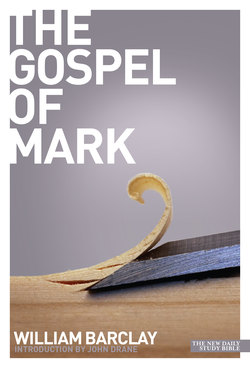Читать книгу New Daily Study Bible: The Gospel of Mark - William Barclay - Страница 29
На сайте Литреса книга снята с продажи.
ОглавлениеTHE JOYOUS COMPANY
Mark 2:18–20
The disciples of John were in the habit of fasting, as were the Pharisees. So they came to Jesus and said, ‘Why do John’s disciples and the disciples of the Pharisees fast, while your disciples do not?’ ‘Surely’, Jesus said to them, ‘his closest friends cannot fast while the bridegroom is still with them? So long as they have the bridegroom they do not fast. But the days will come when some day the bridegroom will be taken away from them – and then, in that day, they will fast.’
WITH the stricter Jews, fasting was a regular practice. In Judaism there was only one day in all the year that was a compulsory fast, and that was the Day of Atonement. The day when the nation confessed and was forgiven its sin was The Fast par excellence. But the stricter Jews fasted on two days every week, on Mondays and Thursdays. It is to be noted that fasting was not as serious as it sounds, for the fast lasted from 6 am to 6 pm and after that normal food could be eaten.
Jesus is not against fasting as such. There are very good reasons why people might fast. They might deny themselves things they like for the sake of discipline, to be certain that they have control over them and not the other way about, to make sure that they never grow to love them so well that they cannot give them up. They might deny themselves comforts and pleasant things so that, after such self-denial, they might appreciate them all the more. One of the best ways to learn to value our homes is to have to stay away from home for a time; and one of the best ways to appreciate God’s gifts is to do without them for a period.
These are good reasons for fasting. The trouble about the Pharisees was that in far too many cases their fasting was for self-display. It was to call the attention of others to their goodness. They actually whitened their faces and went about with dishevelled garments on their fast days so that no one could miss the fact that they were fasting and so that everyone would see and admire their devotion. It was to call the attention of God to their piety. They felt that this special act of extra piety would bring them to the notice of God. Their fasting was a ritual and a self-displaying ritual at that. To be of any value, fasting must not be the result of a ritual; it must be the expression of a feeling in the heart.
Jesus used a vivid picture to tell the Pharisees why his disciples did not fast. After a Jewish wedding, the couple did not go away for a honeymoon; they stayed at home. For a week or so, open house was kept and there was continual feasting and rejoicing. In lives that were hard, a wedding week was the happiest time. To that week of happiness were invited the closest friends of the bride and the bridegroom; and they were called by the name children of the bridechamber. Jesus likened his little company to men who were children of the bridechamber, chosen guests at a wedding feast. There was actually a Rabbinic ruling which said, ‘All in attendance on the bridegroom are relieved of all religious observances which would lessen their joy.’ The wedding guests were actually exempt from all fasting.
This incident tells us that the characteristic Christian attitude to life is joy. The discovery of Christ and the company of Christ are the key to happiness. There was a Japanese criminal called Tokichi Ishii. He was utterly pitiless; he had brutally and callously murdered men, women and children in his career of crime. He was captured and imprisoned. Two Canadian ladies visited the prison. He could not be induced even to speak; he only glowered at them with the face of a wild animal. When they left, they left with him a copy of the Bible in the faint hope that he might read it. He read it, and the story of the crucifixion made him a changed man. Later when the jailer came to lead the doomed man to the gallows, he found not the surly, hardened brute he expected, but a smiling, radiant man, for Ishii the murderer had been born again. The mark of his rebirth was a smiling radiance. The life that is lived in Christ cannot be lived other than in joy.
But the story ends with a foreboding cloud across the sky. No doubt when Jesus spoke of the day when the bridegroom would be taken away his friends did not at the moment see the meaning of it. But here, right at the beginning, Jesus saw the cross ahead. Death did not take him unawares; even now he had counted the cost and chosen the way. Here is courage; here is the picture of a man who would not be deflected from the road at whose end there loomed a cross.
